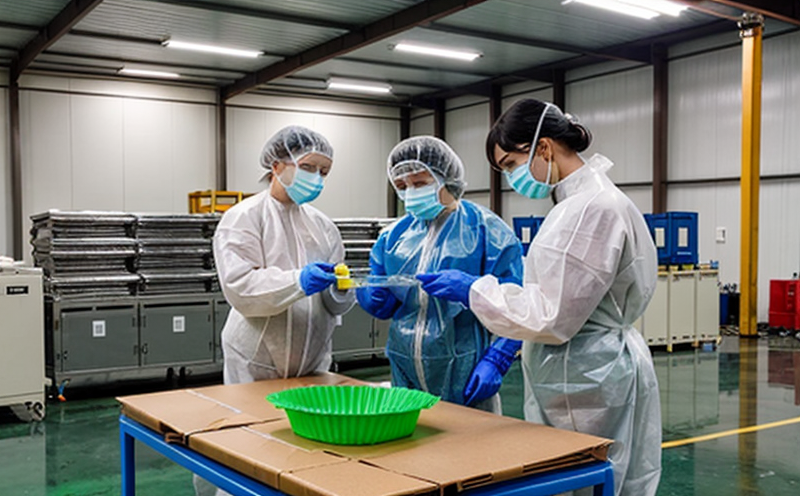ASTM D374-13 Drop and Impact Testing
The ASTM D374-13 standard specifies the procedure for determining the resistance of plastic packaging materials to impact loading. This test evaluates the ability of a specimen to withstand sudden impacts, simulating real-world conditions such as falling packages or being dropped during transport.
This service is essential for ensuring that plastic packaging meets industry standards and regulatory requirements. It helps manufacturers and suppliers verify the durability and integrity of their products under stress, which is crucial for maintaining customer satisfaction and compliance with international standards like ISO 178:2019.
The ASTM D374-13 test method involves placing a specimen on a rigid surface and subjecting it to a series of impacts from a falling weight. The impact force is recorded, and the resulting deformation or damage is observed. This data provides critical insights into the material's performance under dynamic loading conditions.
Understanding how plastic packaging behaves under these conditions is vital for several reasons:
- Product Safety: Ensures that packages do not fail during transport, leading to potential hazards or contamination.
- Customer Satisfaction: Prevents damage to products inside the package, thereby enhancing customer trust and loyalty.
- Compliance: Meets regulatory requirements set by authorities like the Food and Drug Administration (FDA) in the US and similar bodies worldwide.
The testing process is highly precise, employing specialized equipment designed to replicate real-world scenarios. This ensures that the results are reliable and accurate, providing stakeholders with confidence in the product's performance.
Our laboratory adheres strictly to ASTM D374-13 guidelines to ensure consistent and repeatable test results. We use state-of-the-art impact testers capable of generating controlled impacts on various types of plastic packaging materials. This capability allows us to simulate a wide range of potential failure modes, from minor cracks to complete fragmentation.
By conducting these tests, we provide valuable data that can inform design improvements and process optimizations. For example, manufacturers may discover that certain additives or modifications enhance the impact resistance of their products. Such insights can lead to more robust packaging solutions, ultimately benefiting both producers and consumers alike.
Why It Matters
The durability and integrity of plastic packaging are critical factors in ensuring product safety and customer satisfaction. The ASTM D374-13 test is one of the key methods used to assess these properties, particularly focusing on impact resistance. This section will explore why this testing method holds significant importance.
Firstly, the test helps identify potential weaknesses in packaging design that could lead to product damage during transportation or handling. For instance, if a package fails an ASTM D374-13 test, it suggests that the material may not be robust enough to withstand the rigors of distribution channels. Such insights are invaluable for R&D teams looking to enhance their products' performance.
Secondly, compliance with international standards is crucial in today's global market. Many countries have stringent regulations governing packaging materials and methods. By adhering to ASTM D374-13, companies ensure that their products meet these standards, thereby avoiding costly legal issues and potential product recalls.
Furthermore, customer satisfaction plays a pivotal role in the success of any business. A damaged package can lead to frustrated customers who may lose trust in the brand. By investing in ASTM D374-13 testing, businesses can minimize such risks, enhancing their reputation and fostering long-term relationships with consumers.
The test also supports sustainable practices by promoting the use of materials that are both durable and environmentally friendly. This dual benefit aligns with growing consumer awareness regarding environmental impact and corporate responsibility.
In conclusion, ASTM D374-13 testing is not just a regulatory requirement; it's an essential tool for ensuring product safety, enhancing customer satisfaction, and supporting sustainable practices. By incorporating this test into their quality control processes, businesses can stay ahead of industry trends and meet the evolving demands of modern consumers.
Quality and Reliability Assurance
The ASTM D374-13 Drop and Impact Testing service is integral to our commitment to providing high-quality testing solutions. This section delves into how this test contributes to ensuring product quality and reliability.
One of the primary goals of ASTM D374-13 testing is to identify any flaws or weaknesses in plastic packaging materials that could compromise their integrity during use. By subjecting specimens to controlled impacts, we can pinpoint areas where improvements are needed. For example, if a particular type of polyethylene shows signs of cracking after multiple drops, it signals the need for stronger additives or alternative materials.
Our laboratory adheres strictly to ASTM D374-13 guidelines, ensuring that every test is conducted in a consistent and repeatable manner. This consistency is crucial for maintaining reliability across all tests we perform. We employ advanced impact testing equipment designed specifically for this purpose, providing precise measurements of both force applied and resulting deformation.
The data generated from ASTM D374-13 tests serves multiple purposes beyond mere compliance with standards. It provides valuable feedback to R&D teams about the performance characteristics of different materials under various conditions. This information can be used to optimize processes or develop new products that better meet market needs.
In addition, the results help establish benchmarks for quality control. For instance, if a certain batch of packaging consistently passes ASTM D374-13 tests with minimal damage, it indicates high-quality consistency within that production run. Conversely, persistent failures would prompt further investigation into manufacturing processes or raw material sourcing.
By integrating ASTM D374-13 testing into our quality assurance framework, we contribute to the overall reliability of products reaching end users. This commitment translates into better customer experiences and increased confidence in our services among clients across diverse industries such as food & beverage, pharmaceuticals, and electronics.





